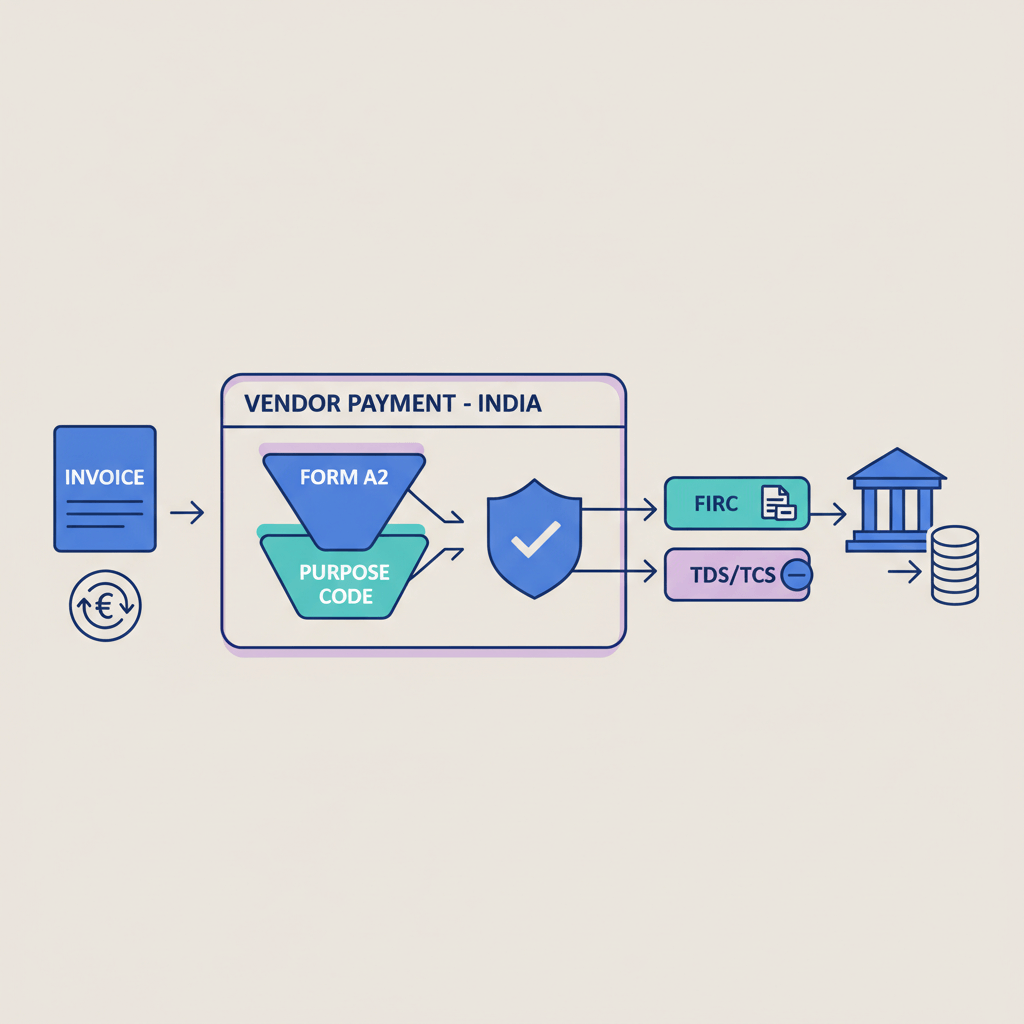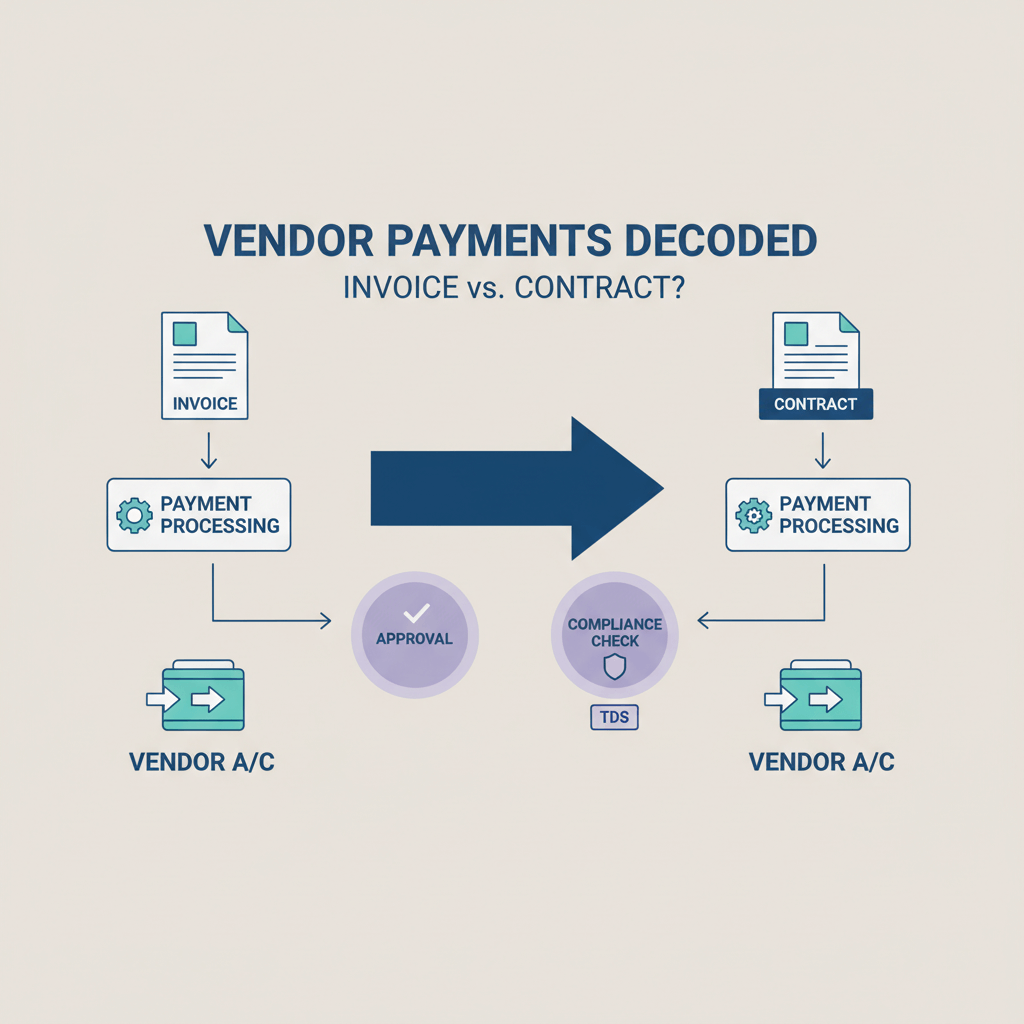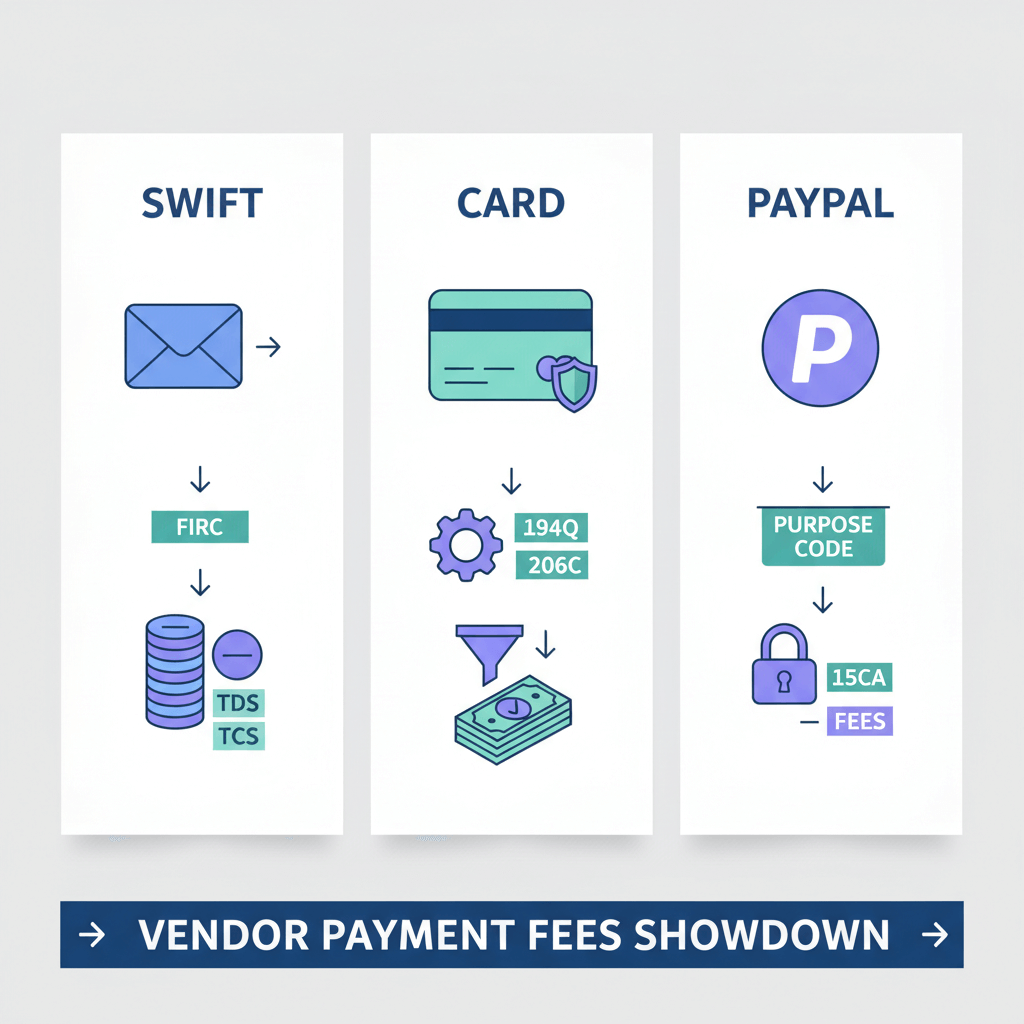It is a well-known fact that global transactions come with a hidden cost—foreign transaction fee.
Usually, it is in the form of a discreet 3% charge imposed by certain banks/credit cards on purchases made in foreign currency. This includes essential international processing costs like currency conversion.
In this blog post, we tell you how to navigate this financial terrain by checking with your bank for a specific foreign transaction fee. Especially companies with frequent business vendor payments, need to consider fee-free options to save big on international purchases.
Read on
What Is a Foreign Transaction Fee?
A foreign transaction fee is charged by some banks/credit cards for purchases in foreign currency or outside the home country.
It generally covers international processing costs including currency conversion and fee by intermediaries.
Make Note: Check with your bank for fees for jumping into making the transaction. In India, fintechs charge less for automated international payments. Consider these fee-free options to save on business purchases.
Foreign transaction fee on credit cards
In the context of import and export payments in India, a foreign transaction fee on credit cards is a charge imposed by credit card issuers for transactions conducted in foreign currencies or with foreign merchants. This fee, typically ranging from 1% to 3% of the transaction amount, is applied to cover the expenses associated with currency conversion and processing international transactions. Businesses involved in import and export activities should consider these fees when utilizing credit cards for international transactions, as they can impact overall operational costs. Exploring credit card options that offer waived foreign transaction fees can help minimize expenses and streamline international payment processes.
Consider a credit card with no foreign transaction fee
In the Indian business context, obtaining a credit card without foreign transaction fee involves several steps:
- Research Indian Banks: Explore the credit card offerings of Indian banks to find options that does not charge foreign transaction fee. Look into premium or travel credit cards that may offer this feature.
- Check Eligibility: Ensure that you meet the eligibility criteria set by Indian banks for credit card applications, including income requirements, credit score, and residency status.
- Compare Offers: Compare the benefits, rewards, annual fees, and other features of different credit cards offered by Indian banks to identify the most suitable option for your business needs.
- Apply Online or In-person: Complete the credit card application process either online through the bank's website or by visiting a branch in person.
- Provide Documentation: Gather and submit the necessary documents, such as identification proof, address proof, and income proof for your business, as required by the bank.
- Await Approval: Once you submit your application, await the bank's review and approval process, which may take a few days to a few weeks.
- Receive and Activate Your Card: If your application is approved, you will receive the credit card by mail. Follow the provided instructions to activate the card before using it for transactions.
- Enjoy Fee-Free Transactions: Upon activation, utilize your credit card for international transactions related to your Indian business without incurring foreign transaction fees.
How can I avoid foreign transaction fee in India?
Adding markup fees for foreign currency transactions to your budget might not be the best scenario, but it could be necessary when dealing with foreign vendors.
These fees have the potential to hinder your company's profits. However, there are ways to steer clear of credit card fees linked to foreign currency transactions.
Foreign exchange fee-less credit card is one of the best ways. Another option to consider is getting a no-foreign transaction fee credit card. These cards do not charge extra fees for foreign transactions and are available from various credit card providers, including Mastercard.
However, obtaining such a card includes research, application, and setup time. Also, these cards typically come with their terms, conditions, and other charges that you should be aware of.
Make Note: Check with your bank for the foreign transaction fees. In India, fintechs charge less for automated international payments. Consider these fee-free options to save on business purchases.
How To Calculate Foreign Transaction Fee
When dealing with outward remittances from India, particularly for sending money abroad, it's essential to consider potential foreign transaction fees. Here's an example of how to calculate foreign transaction fee in the context of an outward remittance:
Identify the Foreign Transaction Fee Percentage:
- Let's say your bank or remittance service provider charges a foreign transaction fee of 2.5%.
Convert the Amount to Local Currency:
- Suppose you are sending ₹50,000 from your Indian bank account to a foreign recipient. Convert this amount to the foreign currency using the prevailing exchange rate. Let's assume the exchange rate is ₹75 for 1 USD.
Calculate the foreign transaction Fee:
- Multiply the converted transaction amount by the foreign transaction fee percentage.
Foreign transaction fee: 2.5% of $666.67 = $16.67 (approximately).
Total Cost with the foreign transaction fee:
- Add the foreign transaction fee to the original transaction amount to find the total cost of the outward remittance.
Total cost: $666.67 + $16.67 = $683.34 (approximately).
Therefore, the total cost of sending ₹50,000 from India to a foreign recipient, including a 2.5% foreign transaction fee, would be approximately $683.34.
Make Note: With Karbon Forex the bank foreign transaction fee for outward remittances is at a flat 0.15% for A1 remittances and 0.25% for A2 remittances. Contact us to know more!
Business remittances with foreign transaction fee in India
The specific types of business transactions subject to foreign transaction fee can vary among banks and financial institutions. However, common scenarios where foreign transaction fee may be applied include
International Wire Transfers:
- Sending funds to a foreign business partner or vendor through an international wire transfer may attract foreign transaction fees.
Let's say an Indian software development company, TechSolutions Pvt Ltd, needs to pay a software licensing fee to a U.S.-based software provider, SoftwareTech Inc. The licensing fee is $50,000, and TechSolutions wants to transfer this amount through an international wire transfer.
Conversion to Local Currency:
- TechSolutions converts the licensing fee from US dollars to Indian Rupees using the prevailing exchange rate. Assuming an exchange rate of ₹74 for 1 USD:
$50,000 converted to INR: $50,000 * ₹74 = ₹37,00,000.
International Wire Transfer:
- TechSolutions initiates an international wire transfer from its Indian bank account to SoftwareTech Inc.'s U.S. bank account.
Foreign Transaction Fee:
- TechSolutions' bank charges a foreign transaction fee of 2% for the wire transfer.
Foreign transaction fee: 2% of $50,000 = $1,000.
Total Cost:
- The total cost of the international wire transfer is the sum of the converted licensing fee and the foreign transaction fee.
Total cost: ₹37,00,000 + $1,000 = ₹37,01,000.
In this example, TechSolutions would pay a total of ₹37,01,000 for the $50,000 international wire transfer, including the foreign transaction fee.
Foreign Currency Invoices and Payments:
- If your business receives invoices or makes payments in a currency other than the local currency (Indian Rupees), foreign transaction fees may be applicable.
Let's consider a real-world example of a business in India, Global Fashion Ltd, purchasing clothing materials from a supplier in Italy, ChicFabrics S.r.l., and receiving a foreign currency invoice:
Invoice Amount in Foreign Currency:
Chic Fabrics S.R.l issues an invoice for the supply of textile materials amounting to 20,000 Euros.
Conversion to Local Currency:
Global Fashion needs to convert the invoice amount from Euros to Indian Rupees. Assuming an exchange rate of ₹85 for 1 Euro:
€20,000 converted to INR: €20,000 * ₹85 = ₹17,00,000.
Foreign Transaction Fee:
When Global Fashion makes the payment in Euros, their Indian bank charges a foreign transaction fee of 1.5% for currency conversion.
Foreign transaction fee: 1.5% of ₹17,00,000 = ₹25,500.
Total Cost:
The total cost of making the payment, including the foreign transaction fee, is the sum of the converted invoice amount and the fee.
Total cost: ₹17,00,000 + ₹25,500 = ₹17,25,500.
Therefore, Global Fashion will pay a total of ₹17,25,500 for the €20,000 invoice, including the foreign transaction fee.
This example illustrates how foreign transaction fees can be incurred when a business deals with foreign currency invoices and makes payments in a currency other than the local currency. Actual fees and exchange rates can vary, contact Karbon Forex to know about the markup fee you are eligible for under the foreign transaction fee!
Overseas Purchases and Expenditures:
- Business transactions involving the purchase of goods or services from foreign suppliers or overseas expenditures may incur foreign transaction fees when paid using an Indian business account.
Let’s consider a simple example:-
Suppose XYZ Electronics Pvt Ltd, an electronics manufacturing company in India, needs to purchase machinery from a supplier in Germany, TechMachines GmbH. The machinery costs 100,000 Euros.
Conversion to Local Currency:
XYZ Electronics needs to convert the purchase amount from Euros to Indian Rupees. Assuming an exchange rate of ₹90 for 1 Euro:
€100,000 converted to INR: €100,000 * ₹90 = ₹90,00,000.
Overseas Payment and Foreign Transaction Fee:
XYZ Electronics makes the payment to Tech Machines GmbH using their Indian business account. Their bank charges a foreign transaction fee of 2% for the currency conversion.
Foreign transaction fee: 2% of ₹90,00,000 = ₹1,80,000.
Total Cost:
The total cost of the overseas purchase, including the foreign transaction fee, is the sum of the converted purchase amount and the fee.
Therefore, XYZ Electronics will pay a total of ₹91,80,000 for the €100,000 machinery purchase, including the foreign transaction fee.
Cross-Border Trade and Commerce:
- Any cross-border trade activities, including importing or exporting goods and services, may involve a specific foreign transaction fee.
If we consider an example:-
ABC Furniture purchased MYR 50,000 worth of furniture from Timber Craft , converting it to ₹9,00,000 at an exchange rate of ₹18 for 1 MYR.
Foreign Transaction Fee:
ABC Furniture's bank imposed a 1.5% foreign transaction fee on the converted amount.
Foreign transaction fee: ₹13,500.
Total Cost:
The comprehensive cost, including the foreign transaction fee, is ₹9,13,500.
In conclusion, ABC Furniture's purchase of MYR 50,000 worth of furniture from TimberCraft Sdn Bhd resulted in a total cost of ₹9,13,500. This included the conversion of MYR to ₹9,00,000 at an exchange rate of ₹18 for 1 MYR, along with a 1.5% foreign transaction fee imposed by the bank, totaling ₹13,500. The foreign transaction fee contributed to the comprehensive cost, highlighting the importance of considering such fees in cross-border transactions.
Bottom Line
In conclusion, foreign transaction fees can be a significant cost when conducting international business in India.
Businesses need to understand these fees and consider ways to minimize them, such as using a credit card with no foreign transaction fee or partnering with a local bank that offers lower fees.
FAQ
Is there any foreign transaction fee for international transactions?
Yes. A foreign transaction fee noted as an FX fee, is an additional charge on your credit card statement incurred when making a purchase that involves a foreign bank or is conducted in a currency other than the U.S. dollar (USD). This fee, imposed by numerous credit card issuers, usually falls within the range of 1% to 3% of the transaction amount.
What is a foreign conversion transaction fee?
A foreign conversion transaction fee is a charge by financial institutions for transactions in a different currency than the account's or card's currency. It covers currency conversion costs and is typically a percentage of the transaction amount.
How can I get a foreign transaction fee waived?
To avoid a foreign transaction fee, consider:
- Selecting a credit card without a foreign transaction fee.
- Choosing a travel credit card that provides benefits such as waived foreign transaction fees.
- Contact your bank or credit card issuer to discuss potential fee waivers, especially if you have a good credit history or are a valued customer.
- Using local currency for purchases abroad to bypass currency conversion fees.
How do I avoid a 3% foreign transaction fee?
Ways to bypass the 3% Foreign Transaction Fee:
- Opt for a credit card without foreign transaction fees. While many credit cards impose these fees, several do not.
- Utilize a debit or checking account that doesn't charge foreign transaction fees.
- Choose to pay in the local currency to avoid additional fees.
Can I waive the foreign transaction fee?
Fortunately, there are deliberate approaches to sidestep foreign transaction fees. You have the option to acquire a credit card or open a checking account that does not impose such fees. Alternatively, opting for cash to cover all your foreign expenditures is a straightforward way to avoid foreign transaction fee.
What is the foreign transaction fee on returns?
If you bought and later returned an item for a refund on your credit card while overseas, there's a possibility of incurring a foreign transaction fee. The exact percentage of this fee varies among credit card companies, but it generally hovers around 3% of the total purchase amount.
Can foreign transaction fee be refunded in corporate remittances?
Generally, no. Fintechs and banks operate on a commission basis for both personal and business remittances. Consequently, while foreign transaction fee might not be reimbursed, the principal payment amount can typically be refunded upon request.











